Author: dorner
Resource: Oxford Research Encyclopedias: American History and Latin American History
 The Library has recently acquired the Oxford Research Encyclopedia of American History and the Oxford Research Encyclopedia of Latin American History, two online resources that provide peer-reviewed and regularly updated essays, as well as links to visual and primary source materials.
The Library has recently acquired the Oxford Research Encyclopedia of American History and the Oxford Research Encyclopedia of Latin American History, two online resources that provide peer-reviewed and regularly updated essays, as well as links to visual and primary source materials.
Exhibit: Institute of Governmental Studies Centennial
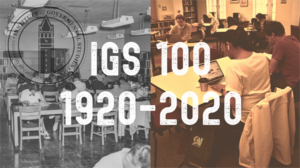 The Institute of Governmental Studies is celebrating its 100th anniversary this year! A hundred years ago, as efforts to reform government corruption were taking root across the country, IGS was founded by political scientists who saw an opportunity to build public administration into an academic discipline to educate new generations of civic leaders. The library has been the heart of IGS since its founding, and holds more than 400,000 items, many of them unique reports, pamphlets, bibliographies, and other ephemera.
The Institute of Governmental Studies is celebrating its 100th anniversary this year! A hundred years ago, as efforts to reform government corruption were taking root across the country, IGS was founded by political scientists who saw an opportunity to build public administration into an academic discipline to educate new generations of civic leaders. The library has been the heart of IGS since its founding, and holds more than 400,000 items, many of them unique reports, pamphlets, bibliographies, and other ephemera.
An exhibit now on display in the IGS Library highlights the people and projects that built IGS over the last century. The Institute will be celebrating its centennial with events and programs throughout the year, so please check igs.berkeley.edu for updates.
The IGS Library is open to the general public and the campus community from 10am-5pm, Monday through Friday. Email igsl@berkeley.edu or call us at 510-642-1472 with any questions.
Primary Sources: Bibliotheca Philadelphiensis
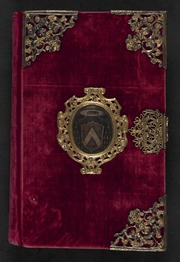 Bibliotheca Philadelphiensis houses its digital collection at the Internet Archive and represents holdings of libraries in the Philadelphia area, including “Princeton, Bryn Mawr, Villanova, Swarthmore, and many more college and university libraries, as well as the American Philosophical Society, National Archives at Philadelphia, and other august institutions of higher learning and conservation.” More information can be found at the Open Culture website.
Bibliotheca Philadelphiensis houses its digital collection at the Internet Archive and represents holdings of libraries in the Philadelphia area, including “Princeton, Bryn Mawr, Villanova, Swarthmore, and many more college and university libraries, as well as the American Philosophical Society, National Archives at Philadelphia, and other august institutions of higher learning and conservation.” More information can be found at the Open Culture website.
Event: Publish or Perish Reframed: Navigating the New Landscape of Scholarly Publishing
In this panel, we’ll unpack the landscape of modern scholarly publishing by exploring economics and stakeholder power structures, and what the University of California is doing to address these issues through recent publisher negotiations.
We will also learn from publishing experts about how to maximize research dissemination, access, and impact through the decisions we make about open access, copyright transfer, and publication choices. Faculty will share publishing advice and guidance for early career researchers as they navigate their academic careers. They will also discuss how tenure and promotion practices are being adjusted to better reflect diversity in publishing outputs and venues. There will be a Q&A session at the end of the discussion.
Speakers will include:
- Benjamin Hermalin, Vice Provost for the Faculty; Professor of Finance and Professor of Economics, UC Berkeley
- Philip B. Stark, Professor of Statistics, Associate Dean, Division of Mathematical and Physical Sciences, Regional Associate Dean (Interim), College of Chemistry and Division of Mathematical and Physical Sciences, UC Berkeley
- Rachael Samberg, Scholarly Communication Officer, UC Berkeley Library
- Timothy Vollmer, Scholarly Communication & Copyright Librarian, UC Berkeley Library
RSVP to join us for this timely conversation on current scholarly publishing issues.

Primary Sources: Diseños Collection at the California State Archives
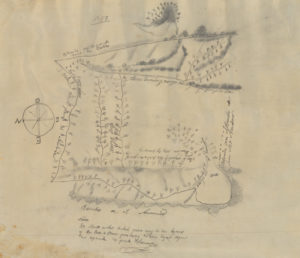
“Within the Diseños Collection there are 493 hand-drawn sketch maps, or diseños, that were created from approximately 1866-1871. These sketch maps were hand-copied from originals that were created from approximately 1827-1846. These are part of a larger collection that makes up the Spanish and Mexican Land Grant Records that also include expedientes, or written documents regarding the grant petition, and other related documents. Each diseño includes naturally occurring boundaries such as rivers, mountains, rock outcropping, and trees as markers. Many of the diseños have labeled neighboring properties and as part of the initial land grant process all boarders were agreed upon by surrounding landowners. The diseños also show existing travel routes, locations of houses and local place names.
“At the end of the Mexican-American War in 1848, California became a territory of the United States after Mexico and the United States signed the Treaty of Guadalupe Hidalgo. Among other things, the treaty directed the U.S. government to honor legitimate land claims of Mexican citizens in the territory. Following California’s statehood in 1850, Congress passed the Land Act of 1851 creating the Board of Land Commissioners. The Board used the diseños, expedientes, U.S. Surveyor General surveys, and other related title documents from landowners to verify individual land ownership and boundaries. Over a period of five years, the Board of Land Commissioners reviewed 813 grant claims, but only approved 553. The Mexican land grant process had a major influence on the development of California land by shaping settlement patterns and land ownership. As some of the earliest maps in California, diseños are essential to understanding the complex system of land ownership in the state today.”
California State Archives: https://www.sos.ca.gov/archives/collections/disenos-collection/
Primary Sources: South Asia Open Archives
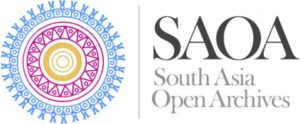 The South Asia Materials Project (SAMP) is an ongoing collaboration between the Center for Research Libraries, US research libraries, and partners from South Asia, that preserves rare and endangered South Asian materials. From that project grew the South Asia Open Archives (SAOA), which includes historical and contemporary sources covering the arts, humanities, and social sciences, in English and South Asian languages, from and about South Asia.
The South Asia Materials Project (SAMP) is an ongoing collaboration between the Center for Research Libraries, US research libraries, and partners from South Asia, that preserves rare and endangered South Asian materials. From that project grew the South Asia Open Archives (SAOA), which includes historical and contemporary sources covering the arts, humanities, and social sciences, in English and South Asian languages, from and about South Asia.
Four SAOA collections (over 350,000 pages) are now freely available on the JSTOR platform:
-
- Caste & Social Structure
- Literature
- Social & Economic History
- Women & Gender
Event: $1 BOOK SALE
$1 BOOK SALE
Homecoming at UC Berkeley
Saturday, October 19
9am – 3pm
180 Doe Library
The 4,000+ books in 180 Doe will be offered for $1 each. Most books are fresh – that is, they have not been offered for sale before. You will find some surprisingly attractive books in the room. I hope that many move from the Library’s shelves to yours.
The Doe Library building will open at 9am on the day of the sale. The best place to wait, if you plan to arrive in advance, is at the south entrance to Doe. Right at 9am I’ll walk over to room 180 with those who have been waiting in line. I’ll ask that everyone maintains his or her place in the line.
Scanners are permitted for those who require an electronic second opinion. Hoarding books for subsequent leisurely review, however, is not.
Thank you for your interest, and we hope to see you there,
Dirk Kennedy
The Library
University of California, Berkeley
Event: Zotero workshops
 David Eifler, the Environmental Design Librarian, will be offering a day of Zotero workshops on Thursday, September 26 in 305 Wurster Hall. The 1-hour introduction to Zotero will repeat at 9am, 11am, 2pm, 4pm, and 5pm.
David Eifler, the Environmental Design Librarian, will be offering a day of Zotero workshops on Thursday, September 26 in 305 Wurster Hall. The 1-hour introduction to Zotero will repeat at 9am, 11am, 2pm, 4pm, and 5pm.
Registration is not required. You are encouraged to download the program and browser connector at www.zotero.org before attending.
Trial: Fold3 database
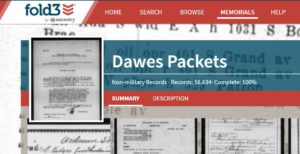 Until October 21, 2019, the Library has trial access to Fold3, which provides access to military records from the Revolutionary War to recent operations in Iraq and Afghanistan, sourced from the National Archives and institutions across the country. The resource also includes non-military records relating to the Holocaust, Black History, Native Americans, the Great Depression, and more.
Until October 21, 2019, the Library has trial access to Fold3, which provides access to military records from the Revolutionary War to recent operations in Iraq and Afghanistan, sourced from the National Archives and institutions across the country. The resource also includes non-military records relating to the Holocaust, Black History, Native Americans, the Great Depression, and more.
Fold3 can be accessed from on campus only. Please send any feedback you have to dorner@berkeley.edu.
Trial: America in World War Two: Oral Histories and Personal Accounts
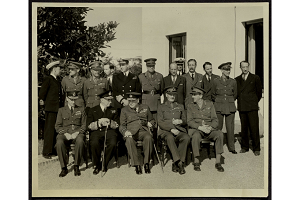 The Library currently has trial access to the Adam Matthew Digital resource, America in World War Two: Oral Histories and Personal Accounts. The collections included in the digital archive are sourced from the National World War II Museum in New Orleans. The publisher states: “Our aim has been to digitize a sizeable proportion of these collections, which document the sweeping narrative of the American experience in this global conflict. In close collaboration with the Museum and with valuable input from our scholarly, editorial board, we have showcased hundreds of archive collections, oral histories and objects. For document collections we have focused on archive content, containing primarily, but not exclusively, diaries, correspondence, scrapbooks, training manuals, periodicals, albums, sketches, greetings cards and photographs. We have also included some rare books, as well as a honed selection of objects, which act as a representative sample of items in the individual collections we have chosen, as well as some choice objects featured in the museum galleries that complement our key themes.”
The Library currently has trial access to the Adam Matthew Digital resource, America in World War Two: Oral Histories and Personal Accounts. The collections included in the digital archive are sourced from the National World War II Museum in New Orleans. The publisher states: “Our aim has been to digitize a sizeable proportion of these collections, which document the sweeping narrative of the American experience in this global conflict. In close collaboration with the Museum and with valuable input from our scholarly, editorial board, we have showcased hundreds of archive collections, oral histories and objects. For document collections we have focused on archive content, containing primarily, but not exclusively, diaries, correspondence, scrapbooks, training manuals, periodicals, albums, sketches, greetings cards and photographs. We have also included some rare books, as well as a honed selection of objects, which act as a representative sample of items in the individual collections we have chosen, as well as some choice objects featured in the museum galleries that complement our key themes.”
Access to the resource ends September 27th. During the trial you will not be able to download documents. Please send your feedback to dorner@berkeley.edu.